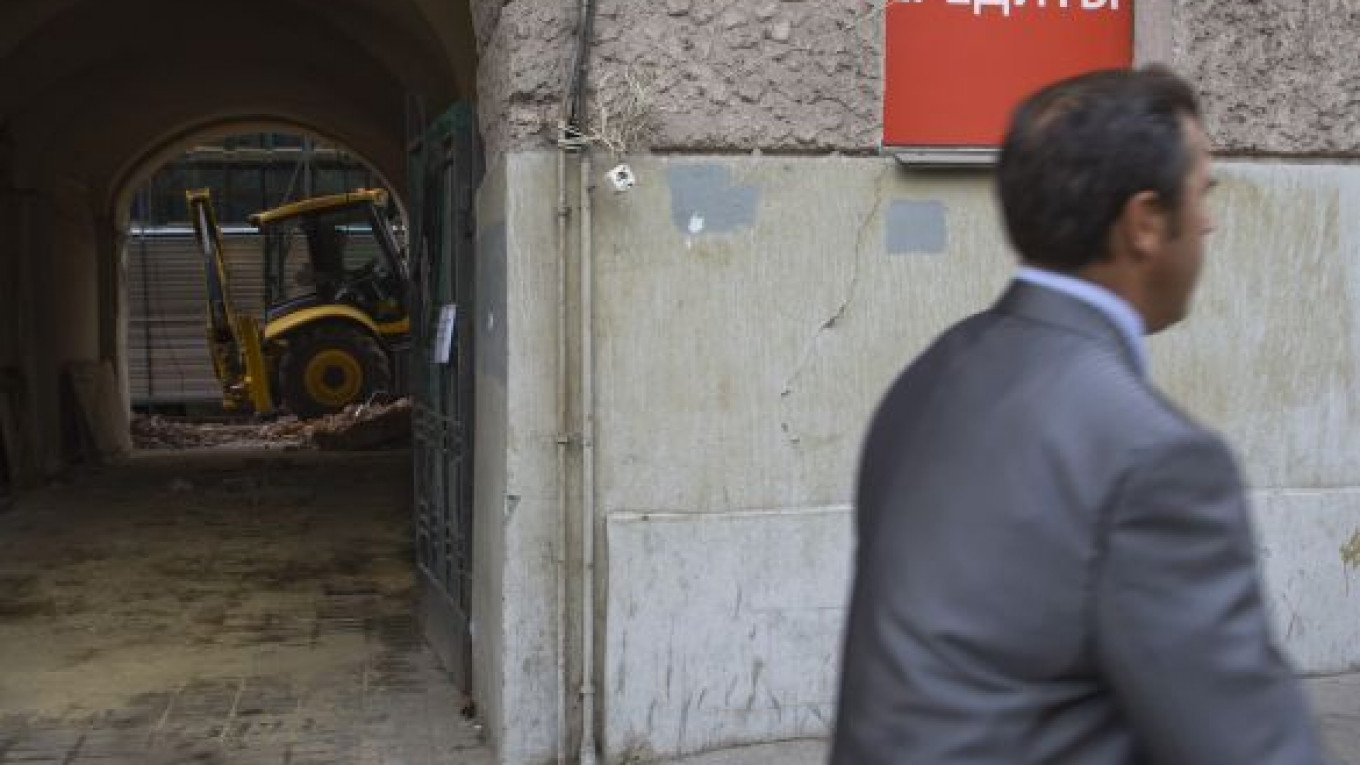Ulyanovsk businessmen have creatively developed an idea of Nobel laureate Muhammad Yunus and are giving out microloans at interest rates of 2 percent daily.
The effective annual rate stands at 732 percent, according to posters near Aktivdengi's stands in stores. The company gives consumer loans of 1,000 to 5,000 rubles ($34 to $168) at interest rates of 2 percent per day for five to 15 days, requiring only a passport and one other form of identification.
Loan approval is given within 15 minutes, and repeat customers are approved within five minutes. About 70 percent of loans are approved, said Mikhail Teplov, a representative of Aktivdengi.
The company operates in 70 commercial points and nine cities, including Novosibirsk, Nizhny Novgorod, Volgograd and Ulyanovsk, as well as in villages. Aktivdengi works with nationwide chains such as Pyatyorochka and Magnit, as well as with smaller regional chains.
Demand pushed the company to the microloan business — in the heat of the crisis people needed to be able to borrow until the next paycheck, Teplov said. The idea was taken from the work of Yunus, who provided microfinance to entrepreneurs, he said. "We decided to start with individuals."
"We give loans in high-traffic places. If someone passes by in a store and he needs 1,000 to 2,000 rubles, then he can borrow from us with only a small collection of documents," co-owner Alexei Merkulov said.
"We aim to build a nationwide chain," co-owner and chief executive Maxim Isayev said.
The company has nearly 500,000 clients, Teplov said, and the average loan is for 3,000 to 4,000 rubles. Aktivdengi's portfolio exceeds $6 million, with overdue loans making up 3 percent of that (1 percent to 15 percent depending on the region), Isayev said.
Aktivdengi's clients are mostly women — 60 percent — from 23 to 29 years old with incomes 30 percent lower than the average for their region, Teplov said.
Aktivdengi's effective annual rate is many times higher than that for similar products. Express loans for household appliances go for 40 percent to 60 percent, while cash loans have a maximum rate of 125 percent.
The Federal Consumer Protection Service and the Federal Anti-Monopoly Service, which recently proposed introducing a tax on usurious interest rates, did not find any violations in Aktivdengi's interest rates.
"If the legal status of this non-bank organization allows them to give loans to citizens and if it properly informs clients of the effective annual rate, then there can be no complaint about the size of the interest rate. Citizens themselves agree to it," said Oleg Prusakov, a department head at the consumer protection service.
Nor does the anti-monopoly service regulate the size of interest rates, especially for companies that do not have a dominating market position, said Andrei Kashevarov, deputy head of the service. If a company informs its clients of the interest rate and does not violate the rights of competitors, there are no grounds for interference from the anti-monopoly service, he said.
The company informs consumers of the size of the effective annual rate, therefore there have been no problems with regulators, Teplov said. "We underwent an inspection by the Federal Consumer Protection Service in several regions."
Retailers do not have any strong feelings about Aktivdengi. A representative for X5 Retail Group told Vedomosti that Aktivdengi does not work with the group itself, only with its regional franchises, whose business X5 does not get involved in. A Magnit representative who does not work with franchises said, "We are a structure that leases space, and it doesn't matter who rents it."
Cooperation with Aktivdengi hardly increases sales, said Nikolai Zhilyakov, head of marketing at retail chain Gulliver. "People plan their food expenses, so they don't take out loans for pelmeni."
A Message from The Moscow Times:
Dear readers,
We are facing unprecedented challenges. Russia's Prosecutor General's Office has designated The Moscow Times as an "undesirable" organization, criminalizing our work and putting our staff at risk of prosecution. This follows our earlier unjust labeling as a "foreign agent."
These actions are direct attempts to silence independent journalism in Russia. The authorities claim our work "discredits the decisions of the Russian leadership." We see things differently: we strive to provide accurate, unbiased reporting on Russia.
We, the journalists of The Moscow Times, refuse to be silenced. But to continue our work, we need your help.
Your support, no matter how small, makes a world of difference. If you can, please support us monthly starting from just $2. It's quick to set up, and every contribution makes a significant impact.
By supporting The Moscow Times, you're defending open, independent journalism in the face of repression. Thank you for standing with us.
Remind me later.






